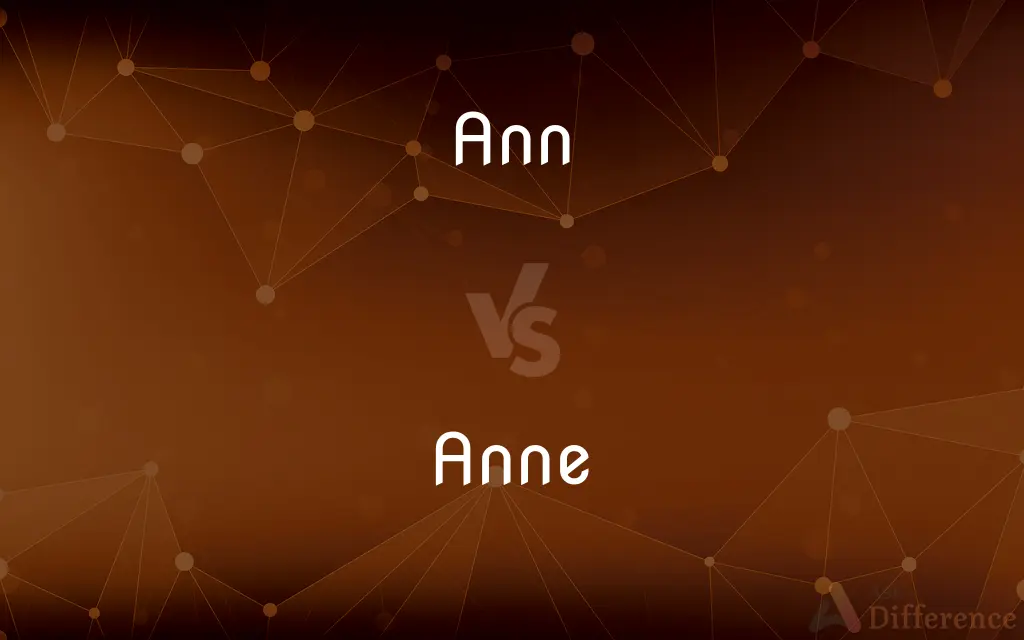Ann vs. Anne — What's the Difference?
Edited by Tayyaba Rehman — By Urooj Arif — Updated on March 12, 2024
Ann is often used in English-speaking countries as a standalone name or suffix, whereas Anne is a French variant, frequently found in historical and royal contexts.

Difference Between Ann and Anne
Table of Contents
ADVERTISEMENT
Key Differences
Ann is a commonly used name in English-speaking countries, often seen both as a standalone name and as a suffix in compound names like JoAnn or LeeAnn. It is typically considered a simpler, more straightforward variant. Whereas Anne, with an "e" at the end, is the French version of the name. It is frequently used in English contexts as well, especially in historical or royal settings, such as Queen Anne of Great Britain or Anne of Green Gables.
The name Ann is perceived as being more modern and versatile, suitable for various ages and personalities. It lends itself easily to diminutives and compound forms, offering a certain linguistic flexibility. On the other hand, Anne carries a classical elegance and is often associated with figures from literature and history, giving it a timeless quality.
Both Ann and Anne are derived from the Hebrew name Hannah, meaning "grace" or "favor." Despite this common origin, the spelling variations have come to signify different cultural and stylistic preferences, with Ann being favored for its simplicity and Anne for its traditional and formal tone.
Ann might be preferred by parents seeking a name that is both simple and easily paired with other names. Meanwhile, Anne is often chosen for its classic and elegant sound, appealing to those who value historical and literary connections.
Though the difference between Ann and Anne might seem minor, it reflects broader cultural and linguistic distinctions. Ann is often seen as more casual and adaptable, while Anne suggests a more formal and refined choice, demonstrating how even a single letter can alter the perception and character of a name.
ADVERTISEMENT
Comparison Chart
Cultural Origin
English
French variation of Ann
Usage Context
Modern, versatile, compound names
Historical, royal, literary contexts
Perceived Attributes
Simplicity, modernity, versatility
Elegance, timelessness, formality
Common Derivations
JoAnn, LeeAnn
None specific; often stands alone
Associations
More casual and contemporary
Classic, associated with history and literature
Compare with Definitions
Ann
Can be part of compound names, adding flexibility.
MaryAnn combines her mother’s and grandmother’s names.
Anne
The French version of Ann, often associated with elegance and history.
Anne’s fascination with the Renaissance mirrors her name’s heritage.
Ann
Derived from Hannah, meaning "grace" or "favor."
Ann’s name carries an elegance that suits her demeanor.
Anne
Carries a classic, timeless quality.
Anne chose a vintage dress that matched the classic beauty of her name.
Ann
Favored for its straightforwardness and modern appeal.
Ann’s name reflects her no-nonsense approach to life.
Anne
Frequently found in historical and royal contexts.
Queen Anne’s reign is a popular subject among historians.
Ann
A simple, versatile name often used in English-speaking countries.
Ann decided to go by her middle name in professional settings.
Anne
Also derived from Hannah, but with a more formal tone.
Anne’s formal demeanor is well reflected in the spelling of her name.
Ann
Often seen as more adaptable and casual.
Ann often changes her hairstyle, much like her versatile name suggests.
Anne
Often chosen for its literary connections, such as Anne of Green Gables.
Inspired by her favorite character, Anne dreams of visiting Prince Edward Island.
Ann
(obsolete) An annate.
Anne
Anne, alternatively spelled Ann, is a form of the Latin female given name Anna. This in turn is a representation of the Hebrew Hannah, which means 'favour' or 'grace.' Anne is sometimes used as a male name in the Netherlands, particularly in the Frisian speaking part (for example, author Anne de Vries).
Ann
A half years's stipend, over and above what is owing for the incumbency, due to a minister's heirs after his decease.
Common Curiosities
Is Anne exclusively used in historical or royal contexts?
While Anne is commonly associated with historical and royal figures, it's also popular in modern contexts, especially among those who appreciate its classic elegance.
What is the main difference between Ann and Anne?
The main difference is cultural and stylistic: Ann is a more straightforward, English variant, while Anne is the French version, often associated with elegance and history.
Why choose the name Ann over Anne?
Parents might choose Ann for its simplicity, modernity, and flexibility in forming compound names.
How do Ann and Anne reflect personal style?
Ann may suggest a more versatile and modern style, whereas Anne might indicate a preference for classic and timeless elegance.
Why might someone prefer the spelling Anne?
Someone might prefer Anne for its traditional, elegant connotation and literary and historical associations.
Do Ann and Anne have the same origin?
Yes, both names are derived from the Hebrew name Hannah, meaning "grace" or "favor."
Are there famous literary characters named Anne?
Yes, one of the most beloved literary characters named Anne is Anne Shirley from "Anne of Green Gables."
How does the cultural origin of a name impact its perception?
Cultural origin can influence a name’s perceived elegance, formality, and the cultural heritage it evokes.
What are the variations of Ann in other languages?
Variations include Ana (Spanish, Portuguese), Hanna (German, Scandinavian), and others reflecting cultural differences.
Can Anne be considered more formal than Ann?
Yes, Anne is often seen as more formal and traditional, associated with historical and literary figures.
What does the name Ann mean?
Ann means "grace" or "favor," similar to its origin, Hannah.
How do Ann and Anne fit into compound names?
Ann is frequently used as a component of compound names, adding flexibility, whereas Anne is less commonly used in this manner, often standing alone for its elegance.
Are there any nicknames common for Anne?
Anne itself is often used in its full form due to its simplicity, but Annie is a common nickname.
Can the choice between Ann and Anne influence a child’s identity?
While a name can influence first impressions, a child’s identity is shaped by a multitude of factors beyond just their name.
Is Ann considered outdated?
Not necessarily; while Ann is classic, it remains popular due to its simplicity and adaptability.
Share Your Discovery

Previous Comparison
Amla vs. Gooseberry
Next Comparison
Diazepam vs. TramadolAuthor Spotlight
Written by
Urooj ArifUrooj is a skilled content writer at Ask Difference, known for her exceptional ability to simplify complex topics into engaging and informative content. With a passion for research and a flair for clear, concise writing, she consistently delivers articles that resonate with our diverse audience.
Edited by
Tayyaba RehmanTayyaba Rehman is a distinguished writer, currently serving as a primary contributor to askdifference.com. As a researcher in semantics and etymology, Tayyaba's passion for the complexity of languages and their distinctions has found a perfect home on the platform. Tayyaba delves into the intricacies of language, distinguishing between commonly confused words and phrases, thereby providing clarity for readers worldwide.














































